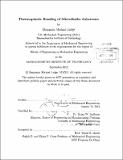| dc.contributor.advisor | Brian W. Anthony. | en_US |
| dc.contributor.author | Judge, Benjamin Michael | en_US |
| dc.contributor.other | Massachusetts Institute of Technology. Dept. of Mechanical Engineering. | en_US |
| dc.date.accessioned | 2013-03-28T18:09:58Z | |
| dc.date.available | 2013-03-28T18:09:58Z | |
| dc.date.copyright | 2012 | en_US |
| dc.date.issued | 2012 | en_US |
| dc.identifier.uri | http://hdl.handle.net/1721.1/78165 | |
| dc.description | Thesis (M. Eng.)--Massachusetts Institute of Technology, Dept. of Mechanical Engineering, 2012. | en_US |
| dc.description | Cataloged from PDF version of thesis. | en_US |
| dc.description | Includes bibliographical references (p. 103-108). | en_US |
| dc.description.abstract | The assembly of microfluidic components for lab on a chip (LOC) applications that are manufactured from commodity thermoplastics is challenging. A survey of plastic welding techniques validates that contour transmission laser welding is the most viable and commercially demonstrated option for flexibility and sensitive microfluidic tolerances. However, understanding laser energy transmission and absorption phenomenon further complicates analyzing microfluidic thermoplastic welding, since the instantaneous material properties vary with both temperature and pressure. Thermoplastic welding has steep thermal gradients due to high thermal resistances, resulting in asymmetric heat affected zones (HAZ). Welding fixture sensitivities may be engineered to tune the weld energy required and a desired HAZ bias to reduce microfluidic channel deformation. Energy imparted by resistively heating thin implants can be easily measured and observed. Resistive heating of implants was demonstrated as a low energy, parallel, and feasible microfluidic welding assembly process. Lessons from implant heating can be applied to more complicated but analogous processes. | en_US |
| dc.description.statementofresponsibility | by Benjamin Michael Judge. | en_US |
| dc.format.extent | 108 p. | en_US |
| dc.language.iso | eng | en_US |
| dc.publisher | Massachusetts Institute of Technology | en_US |
| dc.rights | M.I.T. theses are protected by
copyright. They may be viewed from this source for any purpose, but
reproduction or distribution in any format is prohibited without written
permission. See provided URL for inquiries about permission. | en_US |
| dc.rights.uri | http://dspace.mit.edu/handle/1721.1/7582 | en_US |
| dc.subject | Mechanical Engineering. | en_US |
| dc.title | Thermoplastic bonding of microfluidic substrates | en_US |
| dc.type | Thesis | en_US |
| dc.description.degree | M.Eng. | en_US |
| dc.contributor.department | Massachusetts Institute of Technology. Department of Mechanical Engineering | |
| dc.identifier.oclc | 829681650 | en_US |
